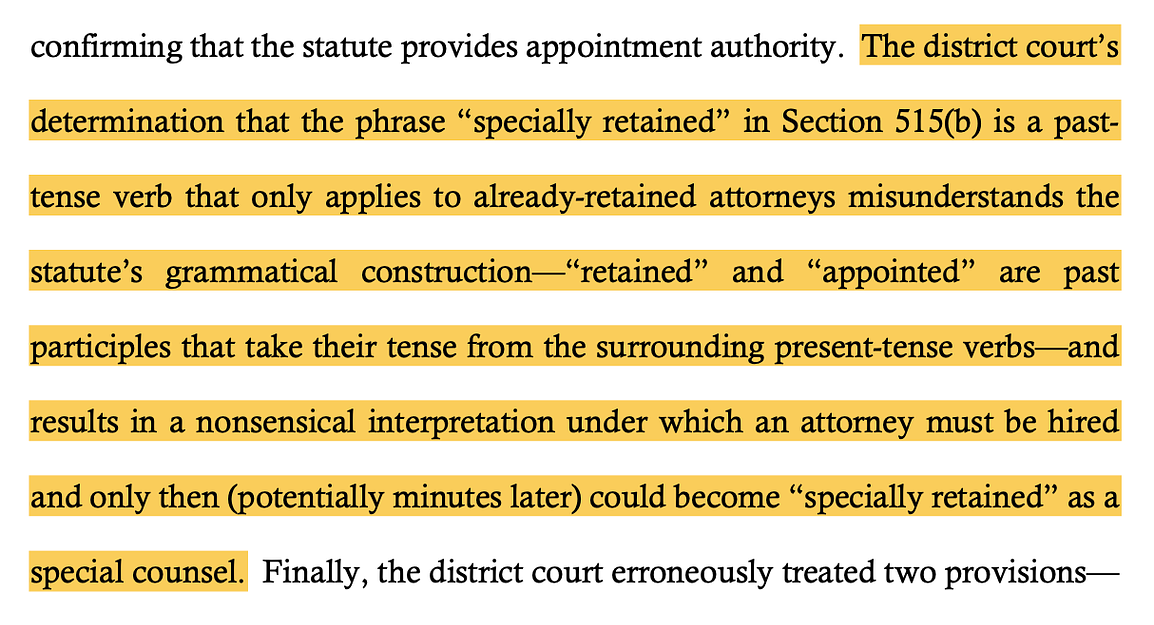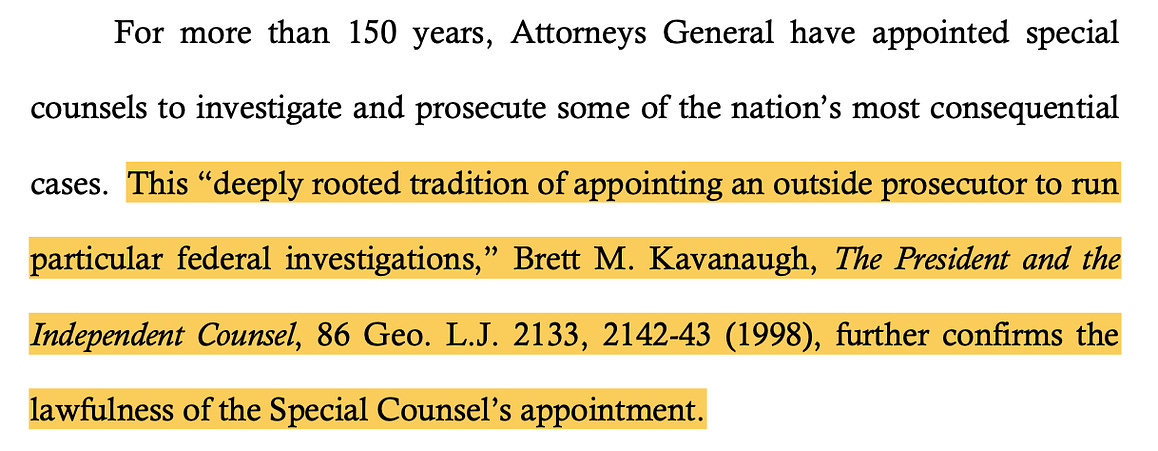Thank you for being one of more than 36,000 people supporting Law Dork with a free subscription! I am so grateful to everyone for reading, subscribing, and sharing Law Dork. That said, my independent legal journalism does cost money to produce. Please consider a paid subscription, as little as $6 a month, to Law Dork today. If you do that, you’ll receive bonus features available only to paid subscribers — and support this essential reporting. I know that not everyone can afford it or prioritize a paid subscription, and, if that’s you, I am so glad you are here! Thanks, Chris Appeals court allows Florida law restricting trans adults' medical care to go into effectThe 2-1 ruling from the Eleventh Circuit was backed by two Trump appointees. Also: Special Counsel Jack Smith is happy to be out of Judge Aileen Cannon's court.In a brief, unsigned order on Monday afternoon, two Trump appointees on the U.S. Court of Appeals for the Eleventh Circuit allowed Florida’s extreme law governing gender-affirming medical care — containing a ban on care for minors and the first-in-the-nation restrictions on adult care — to go into effect while the state appeals a loss below. In a mere seven pages, the two judges — Judges Britt Grant and Robert Luck — essentially reversed, for now, a 105-page June ruling from U.S. District Judge Robert Hinkle, a Clinton appointee, finding the law to be unconstitutional. Judge Charles Wilson, a Clinton appointee on the Eleventh Circuit dissented. In the ruling, issued “by the court,” the Eleventh Circuit acknowledged that the Florida law — despite having a title addressing minors — also affects adult care. In addition to the minor care ban seen in other states, Florida’s law, the court wrote, “allows the prescription and administration of puberty blockers and hormones to adults, and minors who are already taking the drugs, but only ‘by a physician‘ and only after the patient (or the patient’s guardian) signs a written consent while in the same room with the physician.” Despite that, the court relied heavily on a prior Eleventh Circuit panel’s 2023 ruling that Alabama’s ban on gender-affirming medical care for minors is likely constitutional. The two judges on Monday not only saw little difference here — calling the Alabama law “a law very similar to this one” — they also wrote (again, in an unsigned opinion) around the question left open in that Alabama case: animus. In the Alabama case, called Eknes-Tucker v. Governor of Alabama, the appeals court noted that it did not need to address what to do with the law if it had been motivated by “invidious discrimination” because the district court had not found that motivation. Here, Hinkle found otherwise with Florida’s law. “There was no showing of animus in Eknes-Tucker .…” he wrote, introducing more then 25 pages of his opinion discussing the issue. “But there is substantial evidence of animus in the adoption of the statute and rules at issue here.” On Monday, Grant and Luck introduced that issue dismissively, acting as if Hinkle had used a loophole, rather than having straightforwardly applied the appeals court’s past case: After having acknowledged that it viewed the substantially broader Florida restrictions as “very similar” to the Alabama law and having suggested that they saw Hinkle as having tried to enjoin Florida’s law through a loophole, the duo did what they came here to do: Let Florida enforce the restrictive law during the state’s appeal. They wrote that Hinkle “likely misapplied the presumption that the legislature acted in good faith when it concluded that the prohibition and regulation provisions, and the implementing rules, were based on invidious discrimination against transgender minors and adults.” As such, they continued, he “likely misapplied intermediate scrutiny to the provisions and rules.” With that and an even more brief discussion of the other factors courts consider, the court held that the “factors tip in favor of staying the injunction pending appeal.” Then, in a final dig — clearly aimed at preventing the Supreme Court from disturbing this ruling during the appeal — the court ordered that the clerk’s office was “directed to set an expedited briefing schedule and to place this appeal on the next available oral argument calendar.” Although that seems fine enough, the court there cited to the Supreme Court’s recent order rejecting the Biden administration’s request for a partial stay of lower court injunctions blocking the administration’s Title IX sex discrimination rule. Specifically, the Eleventh Circuit judges on Monday pointed to the Supreme Court’s statement that one of the factors it considers — the equities — lessened the need for relief in the Title IX case because, there, the U.S. Court of Appeals for the Sixth Circuit had already scheduled oral arguments. In other words, Grant and Luck ended the order by telling the Supreme Court to leave them be. In his dissent, Wilson highlighted that this was an early and quick review “of a thorough and well-reasoned decision,” and, as such, “I would defer to the judgment of the district court.” Specifically, he highlighted the ways in which the majority misread and dismissed Hinkle’s ruling. In one abrupt portion about the animus motivating the bill, Wilson stated: “I do not read the district court’s decision as one imputing the remarks of a few legislators to the whole. Rather, it reads as recognizing animus as the driving factor for the bill’s consideration at all.” Finally, in closing his dissent, Wilson noted how, even when the court is quoting Hinkle, it does so in a way that suggests more than it should:
In a statement issued on behalf of the organizations representing the plaintiffs challenging the law following the order, the organizations noted they are considering next steps:
At this point, the plaintiffs could seek review of the stay pending appeal from the full court acting en banc or action from the Supreme Court or could, going along with the expedited review, work to move the merits appeal forward as quickly as possible. The plaintiffs are represented by GLBTQ Legal Advocates & Defenders (GLAD), Human Rights Campaign Foundation (HRC), National Center for Lesbian Rights (NCLR), Southern Legal Counsel (SLC), and Lowenstein Sandler LLP. Notably, two of the three judges — Luck and Wilson — who were a part of Monday’s order also were on the panel that last week issued an injunction pending appeal against enforcement of the Biden administration’s Title IX sex discrimination rule in four southern states: Alabama, Florida, Georgia, and South Carolina. In that case, Luck was joined by another Trump appointee, Judge Elizabeth Branch, in issuing the injunction. The opinion, again, was issued “by the court.” Wilson, again, dissented. There, the court had previously issued an “administrative injunction” essentially reversing a ruling from U.S. District Judge Annemarie Axon refusing to block the rule, so the injunction pending appeal didn’t change whether the rule was enforceable in the states. Special counsel Smith explains just how wrong he thinks Cannon wasThe Mar-a-Lago case against Donald Trump never should have been tossed out, Special Counsel Jack Smith told a federal appeals court on Monday, arguing that U.S. District Judge Aileen Cannon had to ignore law and history — as well as grammar — to do so. Smith filed his brief at the U.S. Court of Appeals for the Eleventh Circuit on Monday afternoon seeking to reverse Cannon’s July ruling dismissing the case charging Trump with mishandling classified documents after leaving office and obstructing the investigation into his actions. She had dismissed the case after ruling that his appointment violated the Appointments Clause of the U.S. Constitution and, because of that, the money spent by his office also violated the Appropriations Clause. In summing up the arguments, Smith and the lawyers in his office wrote:
The further you dive into the brief, the more cutting Smith’s arguments are. The main argument, however, is that the U.S. Supreme Court upheld the appointment of the Watergate special prosecutor as an essential element of its ruling in United States v. Nixon. As the lawyers wrote: Later, the lawyers added, “Even if the relevant language from Nixon were dicta, the district court was not entitled to cast aside carefully considered, unequivocal language from a unanimous Supreme Court.” As Smith and team summed up that argument, “Nixon conclusively defeats the defendants’ challenge to the Special Counsel’s appointment, as every other court to have considered the issue has found.” Beyond that, the lawyers highlighted that statutes at issue — 28 U.S.C. §§ 509, 510, 515, and 533, as referenced in Nixon — reinforce that conclusion. As I noted above, at one point, the lawyers essentially say that Cannon just got the rules of grammar wrong: In addressing the history of how the department, government, courts, and — yes — America have dealt with this question, the lawyers showed a fairly strong pedigree for this appointment power. And, they do so in a rather memorable way:
This is a stark legal argument — a point made all the more directly, by a not-so-subtle citation opening the section about the “deeply rooted tradition“ of this power: Trump’s response is due within 30 days, then Smith has 21 days from then to file his reply. You’re a free subscriber to Law Dork, with Chris Geidner. To further support this independent legal journalism, please consider becoming a paying subscriber. |

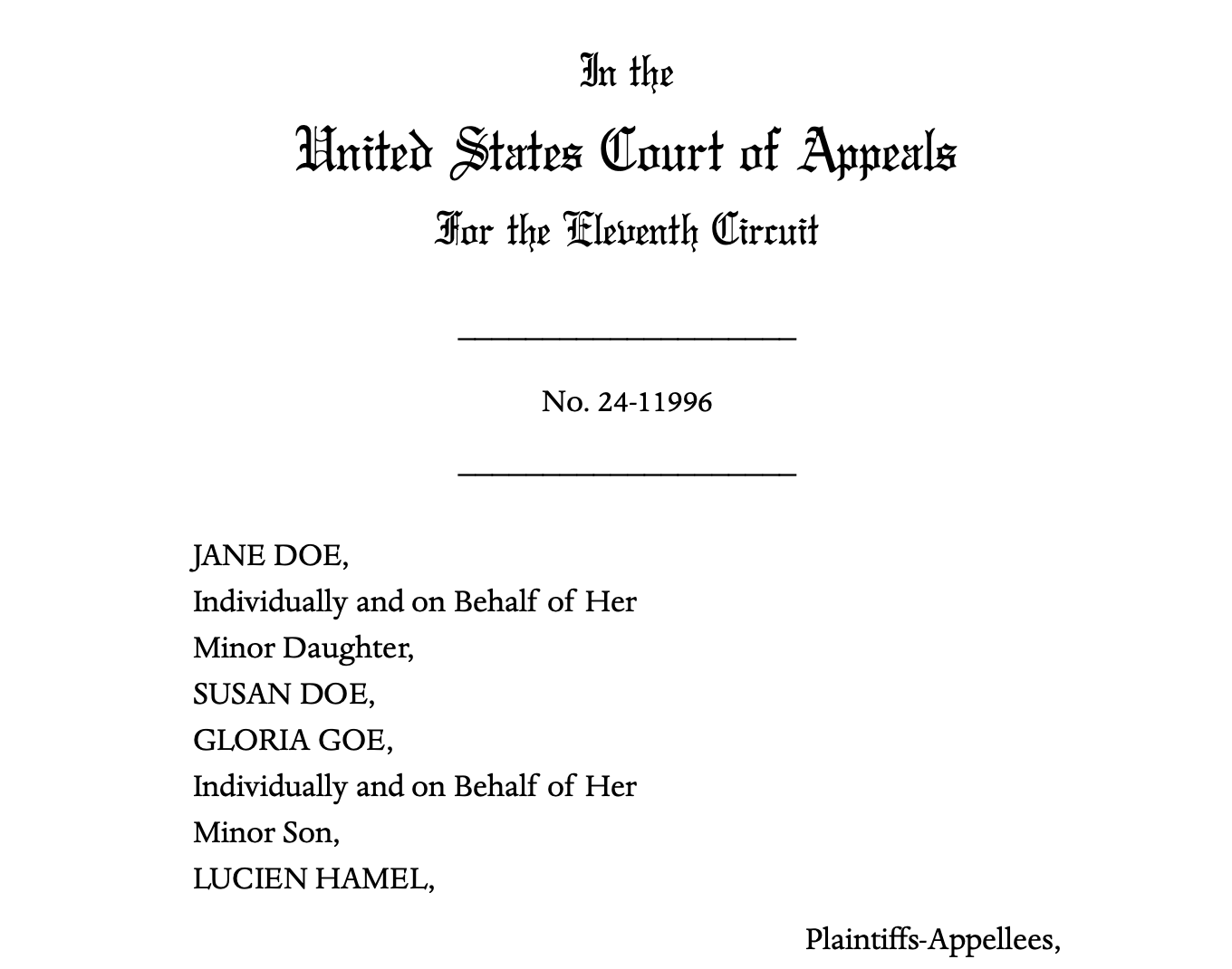
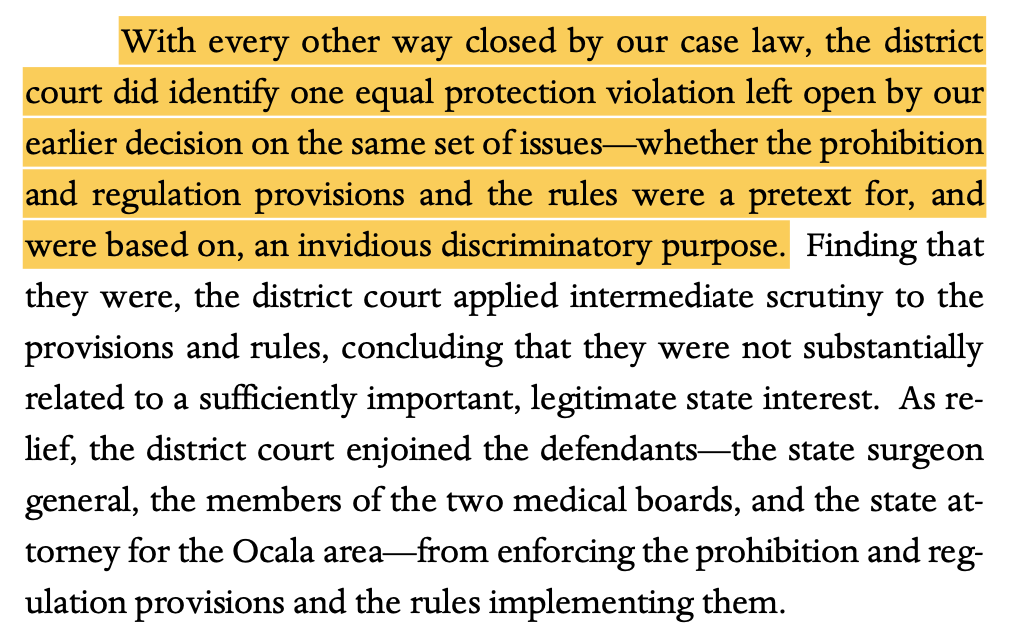
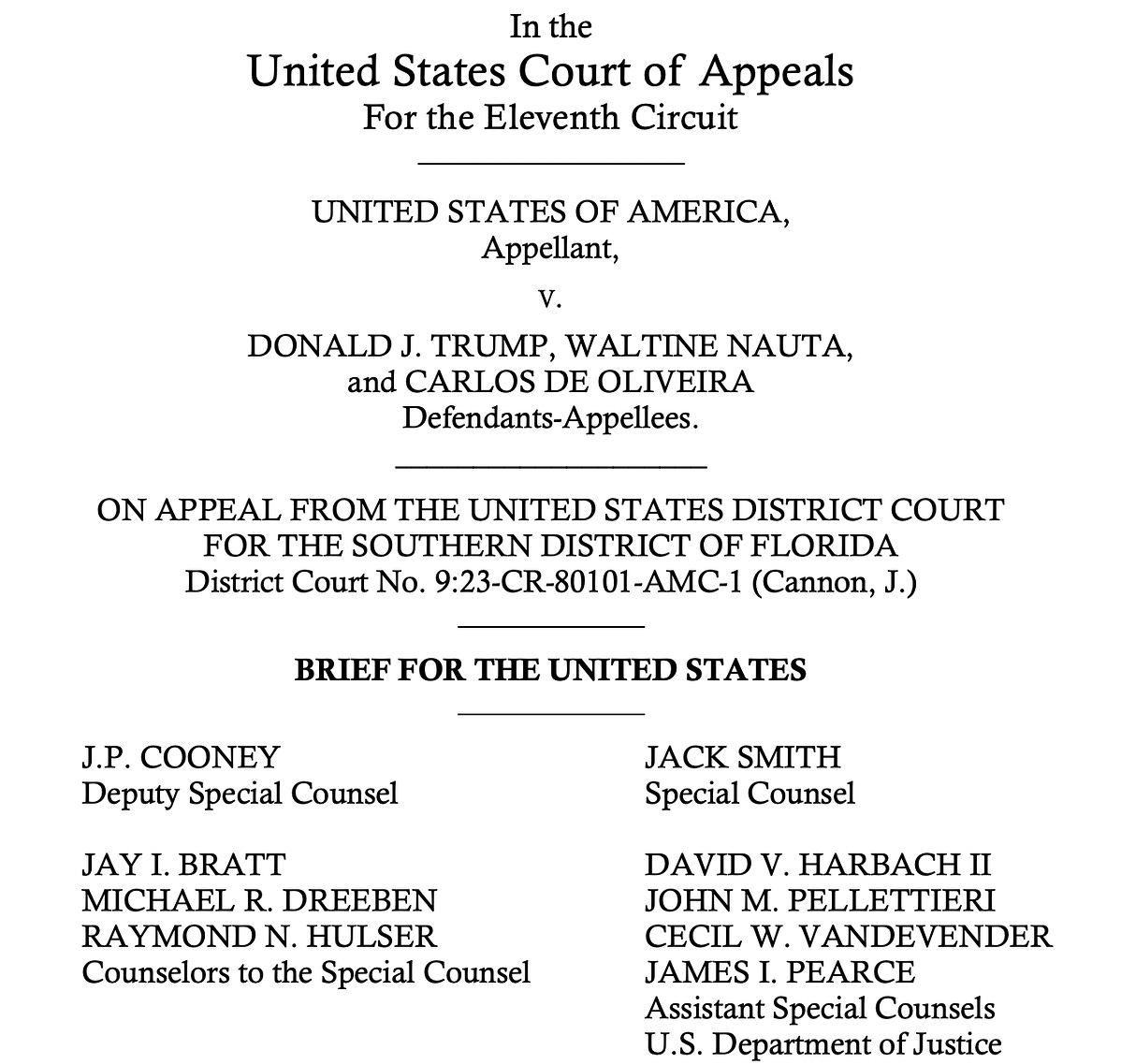
![The district court erred when it deemed that conclusion unpersuasive dicta. Nixon’s statutory analysis was integral to the Court’s “ultimate conclusion[]” and therefore “authoritative.” United States v. Concord Mgmt. & Consulting LLC, 317 F. Supp. 3d 598, 623 (D.D.C. 2018). The district court likewise erred in reasoning that the Supreme Court had assumed the issue without deciding. The Supreme Court regularly uses qualifying language to indicate assumed premises but included no such caveat in Nixon when discussing the Attorney General’s authority to appoint the Special Prosecutor. Nixon therefore binds this Court, just as it did the district court, and reversal is warranted on that ground alone. The district court erred when it deemed that conclusion unpersuasive dicta. Nixon’s statutory analysis was integral to the Court’s “ultimate conclusion[]” and therefore “authoritative.” United States v. Concord Mgmt. & Consulting LLC, 317 F. Supp. 3d 598, 623 (D.D.C. 2018). The district court likewise erred in reasoning that the Supreme Court had assumed the issue without deciding. The Supreme Court regularly uses qualifying language to indicate assumed premises but included no such caveat in Nixon when discussing the Attorney General’s authority to appoint the Special Prosecutor. Nixon therefore binds this Court, just as it did the district court, and reversal is warranted on that ground alone.](https://substackcdn.com/image/fetch/w_1154,c_limit,f_auto,q_auto:good,fl_progressive:steep/https%3A%2F%2Fsubstack-post-media.s3.amazonaws.com%2Fpublic%2Fimages%2Fc0b80a07-4ed0-4edc-bb74-eb00106e1ffa_1732x1166.png)
